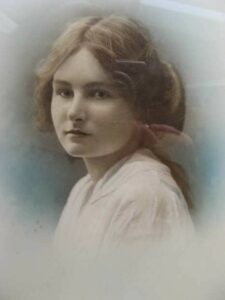PRESS RELEASE ON THE COMMEMORATIVE PLAQUE FOR
Dr. DOROTHEA W. SINTON M.B., Ch.B. 1899 to 1987
On Friday September 23rd at 12 noon, a commemorative plaque will be unveiled by the Lord Mayor of Newcastle at 18 North Avenue in Gosforth. This is to mark the significant contribution of Dr. Dorothea W. Sinton to medical and wellbeing services to the poorest women in Newcastle, particularly in providing birth control advice which was in its infancy in the 1920’s. This was during a period when birth control was considered against the teaching of established religious groups. and women found it extremely difficult to secure gynaecological support.
This event welcomes members of the public to come and honour a pioneering woman in our city. The plaque is being sponsored by Soroptimist International Newcastle upon Tyne, a voluntary women’s organisation dedicated to educating, enabling and empowering women to have an equal voice in our communities.
During the 1920’s, there was extensive public debate about the rights and wrongs of birth control. Advice clinics run by voluntary organisations consolidated their positions, and the fight centred on seeking to remove an official ban which prevented Local Authorities from providing contraception services. Into this fray entered Dr Dorothea Sinton, a newly qualified doctor who had trained at Liverpool Medical School qualifying in 1923, marrying John Harold Sinton from the Wirral in the same year and subsequently they moved to Newcastle upon Tyne.
At the same time progress was being made in Newcastle when a visiting representative from the beginnings of what was to become the ‘Family Planning Association’ in London, Mrs Tamplin, arrived to form a voluntary committee to start a Women’s Advisory Clinic. She found the first premises to be used as a clinic at 670 Scotswood Road which had been a pawn shop in a slum area. It was primitive, rat infested and all hot water had to be heated on a primus stove. However, the progress on forming a supportive committee and attracting funds was more difficult due to the prevailing attitude that this type of medical service was somewhat wicked and immoral. The ladies who were interested in supporting the project could not tell their husbands the truth and the local clergy and medical practitioners were against any progress. Then in 1929, Dr Sinton became the brave pioneer to move this project forward and, as a new and independent doctor in the city, was able to direct and progress the aim of bringing free medical services to the poorest women who already had large families to raise. The establishment of this first Clinic was uphill work and initial funding came from donations of £100 each from Lady Denham and the Durham Miners Welfare Committee. It was uphill work to begin with, as local doctors and clergy had to think of their own bread and butter before linking their names to birth control.
It was a struggle to form a committee of local and influential women to run and raise funds to continue and expand the Women’s Advisory Clinic but in 1934 the clinic was able to move from 670 Scotswood Road to improved premises at 24 Shieldfield Green due to the ongoing support of Dr Sinton’s husband. Woman came for all kinds of gynaecological conditions, as well as for birth control, as they had never had a woman Doctor in the area before. They also came for advice on infertility, which Dr Sinton describes as surprisingly successful given the resources that she had. She was fortunate in finding Mrs. Murray Brooks who worked with her for over 20 years as her Nursing Superintendent who had extensive experience of nursing throughout World War One also in less than ideal conditions.
Dr Sinton fought publicly for the equal rights to education for women, and the recognition of the role of women doctors. In April 1943, she had a letter published in the British Medical Journal advocating the role of women doctors working alongside their male counterparts. She asked her medical colleagues to “look at past and prevailing social and economic conditions in order to discover the causes of the declining birth rate. The reasons, for the existence of contraception services was to enable motherhood, not to degrade it. There is nothing dignified in a diseased woman bringing a sickly child into a poverty-stricken household “. Later Dr Sinton was able to open additional Clinics in the colliery villages around Ashington and Sunderland.
This Commemorative Plaque provided by the City of Newcastle upon Tyne has been sponsored by Soroptimist International Newcastle upon Tyne club who strive to improve the inequalities in the recognition of the contribution that unique women made to our City. Dr Dorothea Sinton and Mrs. Murray Brooks were founder members of this worldwide women’s voluntary organisation when the Newcastle club was chartered in 1937. Their contribution to the improvement in the health and wellbeing of women on Tyneside will not be forgotten.


